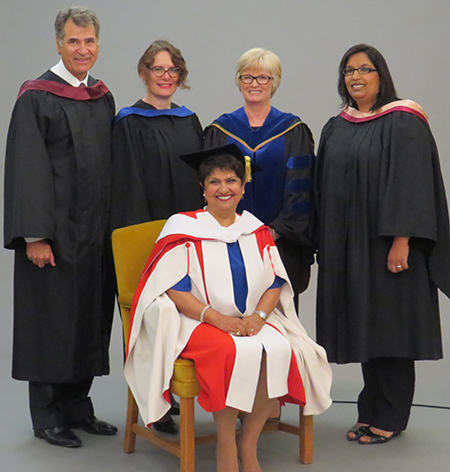
Dr. Saida Rasul received an honourary doctor of science degree during the convocation ceremony June 9.
Philanthropist. Educator. Leader. Community worker.
Saida Rasul has dedicated her life and career as a dentist to improving the lives of the less fortunate. During the convocation ceremony, June 9, Rasul received an honorary doctor of science degree commemorating the centenary of the School of Dentistry. Her connection to the U of A's School of Dentistry was established while working with faculty members to set up dental hygiene programs offered through Aga Khan University in East Africa and Pakistan.
Rasul has a long list of humanitarian work including a longtime volunteer and donor with the United Way, where she was integral in securing an $18-million provincial grant to establish British Columbia's Success by 6 program focused on developing healthy children and families. She's also involved with the Rotary Club, the B.C. Children's Hospital Foundation and the Aga Khan Foundation, to name a few.
How do you feel knowing you are the recipient of the honorary degree?
I feel truly humbled, honoured and in a state of shock. I do not feel that I am deserving of this truly highest recognition from the U of A. Looking at the list of recipients, I am thrilled to be in such esteemed company.
Your reaction/feelings when you first found out?
When the Chancellor called me to inform me of this honour, my feelings were of surprise, shock, thrill, humility, amazement and then tears of joy. This honour is not just for me; it is for all the organizations in BC and Canada that I worked with and my colleagues at the Aga Khan University. I will accept this honour, on behalf of the staff and all the volunteers local and international whom I have worked with.
You have devoted your life to giving back. What motivates you to keep going?
My personal growth, learning from those I work with, the lifelong friendships I make, seeing lives being transformed, giving people hope, educating and sense of satisfaction from empowerment of young women. Most important are the prayers I receive. These are a few of the reasons that keep me motivated and going.
What set you on the path to serving the community?
Being an Ismaili Muslim it is part of our faith and ethos to volunteer. I watched my parents and grandparents do this as I was growing up. I am trying to emulate them. Everyone tells me that "I give" but I say "I get; I get way more than I give". For me, the opportunity to serve the community is a blessing.
What would you like to say or share with the graduates today?
They should be passionate about whatever they do, excel in their fields and always strive to give back to society locally and internationally. They will realize that they are richer for it and they will feel truly fulfilled as they will get much more than they could ever imagine.
You've designed two preventative dental programs in East Africa and Pakistan, how has this impacted these areas?
The program is still in its infancy. We just graduated our first Diploma of Dental Hygiene class late last year. However, having said that we have with the help of the Aga Khan Health Services (our sister agency), placed 7 of our interns in communities in the remote areas of Pakistan. The interns are already educating the communities that they are working in, on oral hygiene, gum disease, nutrition counselling, cancer, the effects of smoking, chewing beetle nut and other substances on the oral mucosa. We need to follow these and measure the impact. At the Aga Khan University hospital in Karachi we are creating awareness, educating the population about oral hygiene. The 3 interns who graduated last year whom we hired at AKU are running programs for cancer support groups, cardiology, diabetes and children, plus children with disabilities. We are educating all stakeholders including dentists on the "value add" of the hygienist. The hygienists are educating the dentists in their own way. I am happy to report that our volumes for hygiene have increased and we are getting more "buy in" from the dentists. In East Africa, it is a small program, however we run school oral hygiene and nutrition programs which have become very effective. The children are our ambassadors with their families. About 3 to 4 years ago the dentists, who were feeling threatened, cannot do without the hygienists today.